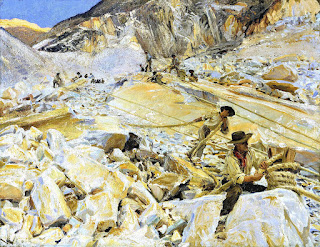Edward Hutton's visit to the marble quarries of Carrara provided a rare unpleasant experience. In fact, his description of going up the mountain reads like an ascent into Hell.
In all Carrara and the valley of Torano I saw no beautiful or distinguished faces, --the women were without sweetness, the men a mere gang of workmen. Now, common as this is in any manufacturing city of the North, it is very uncommon in Italy, where humanity has not been injured and enslaved by machinery as it has with us….
I understood this better when, about four o’clock on the next morning, I went in the company of a lame youth into the quarries themselves. There are some half-dozen of them, glens of marble that lead you into the heart of the mountains, valleys without shade, full of a brutal coldness, an intolerable heat, a dazzling light, a darkness that may be felt. Torano, that littler town you come upon, at the very threshold of the quarries, is like a town of the Middle Ages, full of stones and refuse and narrow ways that end in a blind nothingness, and low houses without glass in the windows, and dogs and cats and animals of all sorts…among which the people live. Thus busy with frightful labour among the stones in the heart of the mountains, where no green thing has ever grown, or even a bird build her nest, where in summer the sun looks down like some enormous moloch, and in winter the frost and the cold scourge them to their labour in the horrid ghostly twilight, the people work. The roads are mere tracks among the blocks and hills of broken marble…which are hauled on enormous trolleys by a line of bullocks in which you may often find a horse or a pony. Staggering along this way of torture, sweating, groaning, rebelling, under the whips and curses and kicks of the labourers, who either sit cursing on the wagon among the marble, or, armed with great whips, slash and cut at the poor, patient brutes, the oxen drag these immense wagons over the sharp boulders and dazzling rocks, … pulling as though to break their hearts under the tyranny of the stones, … Out of this insensate hell come the impossible statues that grin about our cities. Here, cut by the most hideous machinery with a noise like the shrieking of iron, the mantelpieces and washstands of every jerry-built house and obscene emporium of machine-made furniture are sawn out of the rock. There is no joy in this labour, and the savage, harsh yell of the machines drown any song that of old might have lightened the toil. Blasted out of the mountains by slaves, some 13,000 of them, dragged by tortured and groaning animals, the marble that might have built a Parthenon is sold to the manufacturer to decorate the houses of the middle classes, the studios of the incompetent, the streets of our trumpery cities. Do you wonder why Carrara has never produced a sculptor? The answer is here in the quarries that, having dehumanized man, have themselves become obscene…. The quarries are worked for money, not for art. The stone is cut not that Rodin may make a splendid statue, but that some company may earn a dividend. As you climb higher and higher, past quarry after quarry, it is a sense of slavery and death that you feel….an anxious and disastrous silence surrounds you, the violated spirit of the mountains that has yielded only to the love of Michelangelo seems to be about to overwhelm you in some frightful tragedy…. Then, as you return through the sinister town of Torano with its sickening sights and smells, you come into the pandemonium of the workshops, where nothing has a being but the shriek of the rusty saws drenched with water, driven by machinery, cutting the marble into uniform slabs to line urinals or pave a closet. At last, in a sort of despair, overwhelmed with heat and noise, you reach your inn, and though it be midday in July, you seize your small baggage and set out for where the difficult road leads out of this spoiled valley to the olives and the sea.
###
Edward Hutton: Florence and Northern Tuscany with Genoa, second edition, London, 1908. Pp. 66-69.

No comments:
Post a Comment